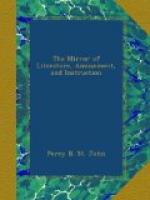INA.
* * * * *
THE COOK AND THE CRANES.
FROM THE SPANISH.
(For the Mirror.)
Don John de Ayala,—a
chap
Whose worst mishap
Was to be curs’d with a purloining
cook.
(A fellow, who ’twas
plain
Play’d “cut and
come again,”
And scarcely reck’d, if all was
seen he took.)
Don John de Ayala, went forth to look
For birds, and shot a crane;
Which, forthwith giving the aforesaid
knave
To cook, according to the
Spanish taste;
He, to his dainty-loving sposa
gave
A leg at once, well deeming,
that to waste
So fair an opportunity for sin
Would be (as he should
say a burning shame;)
But, when the bird, at dinner-time went
in,
Cried Juan, “Where’s
the left leg of my game?”
“Soul of my body, sir!” roar’d
cook,—no fire
In his own kitchen, showing
phiz more red,
Yet whether thus, from guilt he blazed,
or ire,
Or shame perdie, hath
ne’er been sung or said,
“Soul of my body!—other
leg?—Well done!—
No crane that e’er I saw,
had more than one.”
Juan, thus silenc’d, but not satisfied,
In his own mind revolv’d
The neatest way
Of telling master Brazenface, he lied;
And so resolv’d
To take him out crane-shooting
the next day.
They went:—“Well, cook,”
quoth Ayala, “for fun
I’ve brought thee here,
Where quickly ’twill
appear
That if cranes have not two legs,—why,
they’ve none.”
“Say you so, Senor?—look!—yon
long-neck’d flock,
Each bird of it on one foot, ends
the matter;
Ay—there they stand,—as
firm as any rock,
I swear by ev’ry dish I ever broke,
or platter.”
Straight to the flock, flight,
covey, (we’ve no name
In Albion, to designate such
game.)
Rush’d Ayala, whose hearty psho!
psho! psho!
Took the cranes off one leg,—discovering
two,
As up they rose, on rustling, sullen wing:
“Well cook?” “Why, body
of my soul, sir, there’s the thing,
Had you said psho! psho! to your
roasted crane,
Belike you’d seen its hidden leg
again!”
M.L.B.
* * * * *
SPOONS.
(For the Mirror.)
Spoons are objects of great antiquity, and our forefathers bestowed great pains in enriching them with masterly workmanship. So much did taste and fashion rule the time then, that spoons were distinguished as it were by so many devices. It was, and is still with some persons, a custom to present spoons at christenings, or on visiting “the lady in the straw;” and in both cases they were adorned with suitable imagery. A gentleman with whom




